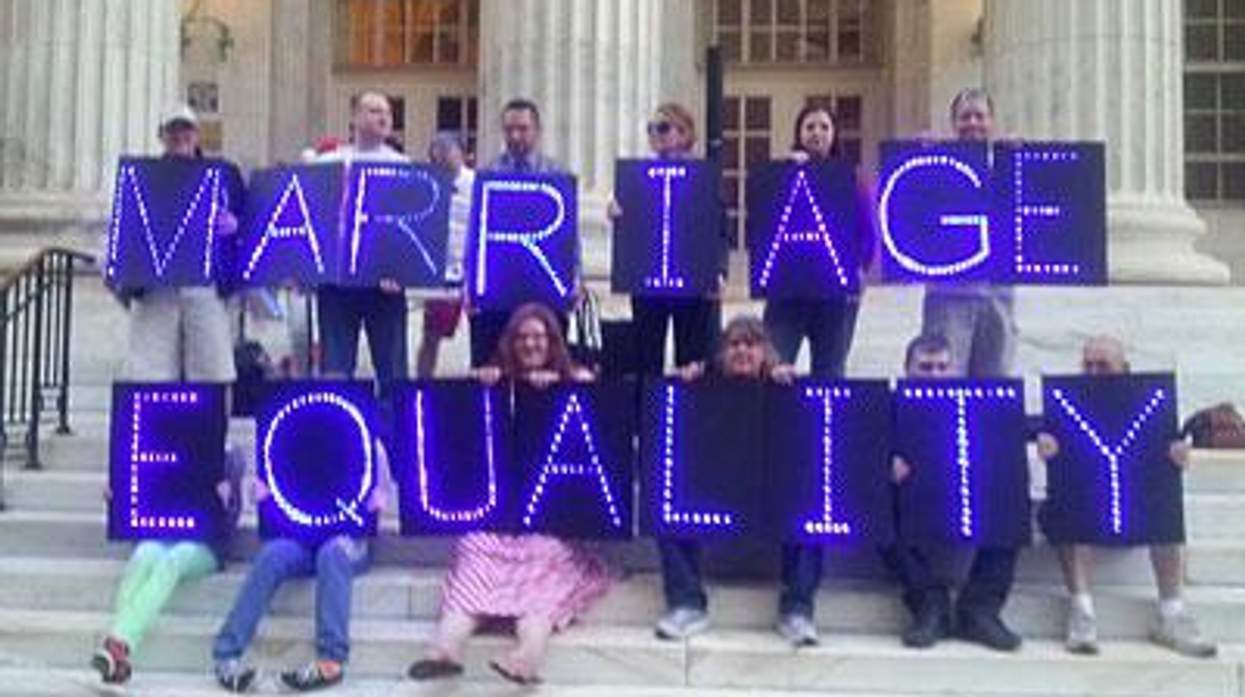A state judge has determined that a 2006 Colorado constitutional amendment forbidding same-sex marriage violates the U.S. Constitution's guarantees of equal protection and due process, making the Centennial State the latest to see an anti-marriage equality law struck down.
Adams County District Court Judge C. Scott Crabtree delivered his ruling in Brinkman v. Long today, a case filed by private attorneys on behalf of a same-sex couple who argued the state's refusal to allow them to wed violated their rights under the U.S. Constitution, according to the Associated Press.
Although Crabtree's ruling included a stay -- meaning same-sex couples cannot yet begin marrying in Colorado -- it also pointed to Colorado's 2013 enactment of civil unions as proof that existing marriage law is discriminatory.
"The Court holds that the Marriage Bans violate plaintiffs' due process and equal protection guarantees under the Fourteenth Amendment to the U.S. Constitution," Crabtree wrote. "The existence of civil unions is further evidence of discrimination against same-sex couples and does not ameliorate the discriminatory effect of Marriage Bans."
In applauding today's decision -- which becomes the 24th consecutive pro-equality ruling in state and federal courts since last summer's landmark victory in U.S. v. Windsor -- the Human Rights Campaign noted that the ruling fell on a particularly apt anniversary.
"It is fitting that today, the 146th anniversary of the Fourteenth Amendment to the U.S. Constitution, that a Colorado court has struck down the state's discriminatory marriage ban relying on the equal protection clause," said HRC's legal director Sarah Warbelow. "These marriage bans will continue to fall because the Constitution does not allow for such blatant discrimination."
One Colorado, the statewide equality organization and its partners in the Why Marriage Matters Colorado campaign, which were not a party to the suit but suppors the ongoing cases seeking the freedom to marry, similarly applauded today's decision, putting it in context with several other pro-equality rulings impacting Colorado.
"Today's ruling, combined with the earlier decision of the 10th Circuit Court of Appeals, leaves no room for doubt that Colorado's ban on marriage for same-sex couples is unconstitutional and indefensible," said Wendy Howell, state director of Why Marriage Matters Colorado, in a statement. "With court after court recognizing the freedom to marry, their decision should be a simple and immediate one. We call on Colorado Attorney General John Suthers and the other defendants to let today's historic ruling stand and to drop, once and for all, their defense of Colorado's unconstitutional marriage ban."
Attorney General Suthers has been embroiled in an increasingly contentious battle with Boulder County Clerk Hillary Hall, whose office began issuing marriage licenses to same-sex couples after the 10th Circuit Court of Appeals in Denver upheld a ruling striking down Utah's ban on marriage equality. Because the 10th Circuit holds jurisdiction over Colorado, the Boulder clerk contends that its ruling is binding on Colorado's marriage law as well.
The state's Republican attorney general, however, continues to claim that the stay issued in that Utah case applies to Colorado too and has subsequently ordered the clerk to stop issuing licenses to same-sex couples or face legal action. Responding to a federal lawsuit filed last week by six same-sex couples seeking the freedom to marry in Colorado, the attorney general acknowledged that the state's ban is likely unconstitutional, but asked the federal judge to quickly decide the case and issue a stay with that decision, even if it means striking down Colorado's constitutional amendment.
While the federal case has yet to be scheduled for a hearing, another lawsuit seeking the freedom to marry was filed by nine same-sex couples in state court in Denver this February.





































































Charlie Kirk DID say stoning gay people was the 'perfect law' — and these other heinous quotes